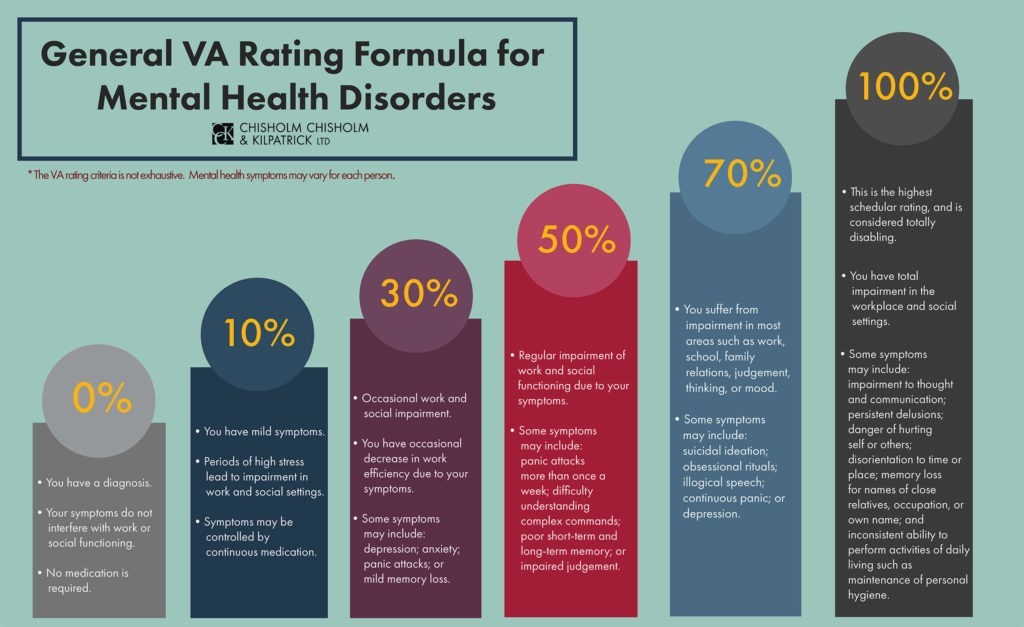Getting Veterans (VA) Disability for Mental Illness

If you are a veteran suffering from a mental illness, you might be eligible for disability benefits. Many mental illnesses qualify for VA disability if they resulted from an event that occurred during your military service. A disability attorney from Chisholm Chisholm & Kilpatrick can examine your case and advise you on obtaining veterans (VA) disability for mental illness.
We can put our experience and resources to work for you. Call today for a free consultation: 401-331-6300.
What mental illnesses qualify for VA disability?
The VA considers several categories of mental illness eligible for disability. We can obtain a grant for you by presenting a valid diagnosis in one of these categories and proving that your mental illness is service-related. The eligible categories of mental illness include:
- Anxiety (including panic disorder and post-traumatic stress disorder)
- Amnesia
- Chronic adjustment disorder
- Cognitive disorders
- Eating disorders (e.g., anorexia and bulimia)
- Mood disorders
- Schizophrenia and other psychotic disorders
- Somatoform disorders (i.e., mental disorders that manifest as unexplained physical ailments)
How do I establish service connection?
The most important part of our job as your VA disability attorneys is establishing service connection for your disability. The VA requires proof that a specific incident or occurrence during your military service caused or contributed to your mental illness, or worsened an existing condition. To establish service connection, we need to do the following:
- Show that a doctor or medical professional diagnosed you with a qualifying mental illness
- Identify a specific illness, injury, or event that occurred during active duty and precipitated your mental illness
- Provide medical evidence creating a nexus, or link, between the incident and your mental illness diagnosis.
It is important to be aware that the VA has a list of mental illnesses for which it will not grant service connection. This list includes intellectual disabilities and personality disorders, such as antisocial personality disorder and borderline personality disorder, etc.
That said, if you have an existing personality disorder but develop post-traumatic stress disorder (PTSD) as the result of an incident during your service, your existing disorder does not necessarily prevent you from receiving benefits for your PTSD.
What if I had a preexisting diagnosis?
Even if you received your initial diagnosis before your military service, you might still qualify for VA disability benefits for your mental illness. We would need to prove that your military service aggravated, or worsened, your preexisting mental illness beyond its natural progression.
The process is similar to proving service connection. The difference is, the VA classifies the worsening of a preexisting condition due to military service as “service connection based on aggravation by such service.”
How Are Mental Disorders Evaluated by VA?
When assigning a disability rating for a service-connected mental disorder, VA uses the General Rating Formula for Mental Disorders. This rating scale ranges from 0% to 100% based on the severity of the condition. Unlike other service-connected disabilities, mental health disorders are not rated in 10% increments. Instead, VA regulations provide for ratings of 0%, 10%, 30%, 50%, 70%, and 100%. A 0% disability rating indicates that a mental condition has been formally diagnosed, but the symptoms are not severe enough either to interfere with occupational and social functioning or to require continuous medication. On the other hand, a 100% disability rating indicates total occupational and social impairment due to the condition. Most often, veterans receive ratings that fall somewhere between those extremes.

What If I Have More Than One Mental Disorder?
Since mental health conditions share similar symptomology, VA will consider the combined effects of the conditions to determine the overall level of occupational and social impairment. Therefore, while you may have more than one diagnosed mental disorder, VA will only assign one disability rating. For example, it is very common for veterans to suffer from both PTSD and anxiety. Although VA has different diagnostic codes for these two conditions, all mental disorders are rated under the same criteria as listed above. As such, a veteran might only receive a total rating of 50% for both of these conditions. Overall, VA does not take into account the number of mental disorders, but instead the severity and impact of each in order to assign a single, comprehensive rating.
Do I Have to File A Claim for Each of My Mental Disorders Separately?
When you submit a claim for a particular mental health condition, VA will process your claim as a claim for any mental health condition. Specifically, VA looks at the description of your claim, the symptoms that you describe, the information and evidence that you submit, and any other information and evidence obtained. Therefore, VA does not limit its consideration to the particular mental disorder that was identified in your claim. For example, if a veteran’s initial claim for PTSD, but the record reflects that he or she is also diagnosed with an anxiety disorder, VA is required to consider the anxiety disorder in connection with the initial claim for PTSD. As such, the assigned rating will reflect the severity and impact of both.
How much can I receive in VA benefits for my mental illness?
The VA rates disabilities based on their severity. The more your mental illness affects your ability to support yourself and execute activities of daily living, the higher your rating.
For mental illnesses, possible VA disability ratings are 0, 10, 30, 50, 70, or 100 percent. A rating of 0 percent does not qualify for you for monthly compensation. A rating of 100 percent indicates total occupational and social impairment and thus qualifies you for the maximum benefit amount. If the VA rates you at 30 percent or higher, you can receive additional benefits for dependents living in your household.
As of December 1st, 2023 the VA disability rate benefit amounts are as follows:
- 0 percent disability rating: $0.00 per month
- 10 percent disability rating: $171.23 per month
- 30 percent disability rating: $524.31 per month
- 50 percent disability rating: $1,075.16 per month
- 70 percent disability rating: $1,716.28 per month
- 100 percent disability rating: $3,737.85 per month
Do I need a lawyer to receive VA disability benefits for mental illness?
The VA permits you to apply for disability benefits on your own. However, you have a better chance of a favorable outcome when you have a qualified and experienced VA disability attorney working on your behalf.
The veterans claims advocates at Chisholm Chisholm & Kilpatrick LTD focus exclusively on VA disability cases and understand the complexities and nuances — of which there are many — involved in the process. We can put our years of experience, our extensive knowledge, and our vast resources to work as we aggressively pursue the the benefits you earned and deserve.
The consultation is always free, so call our office today: 401-331-6300.
Share this Post
